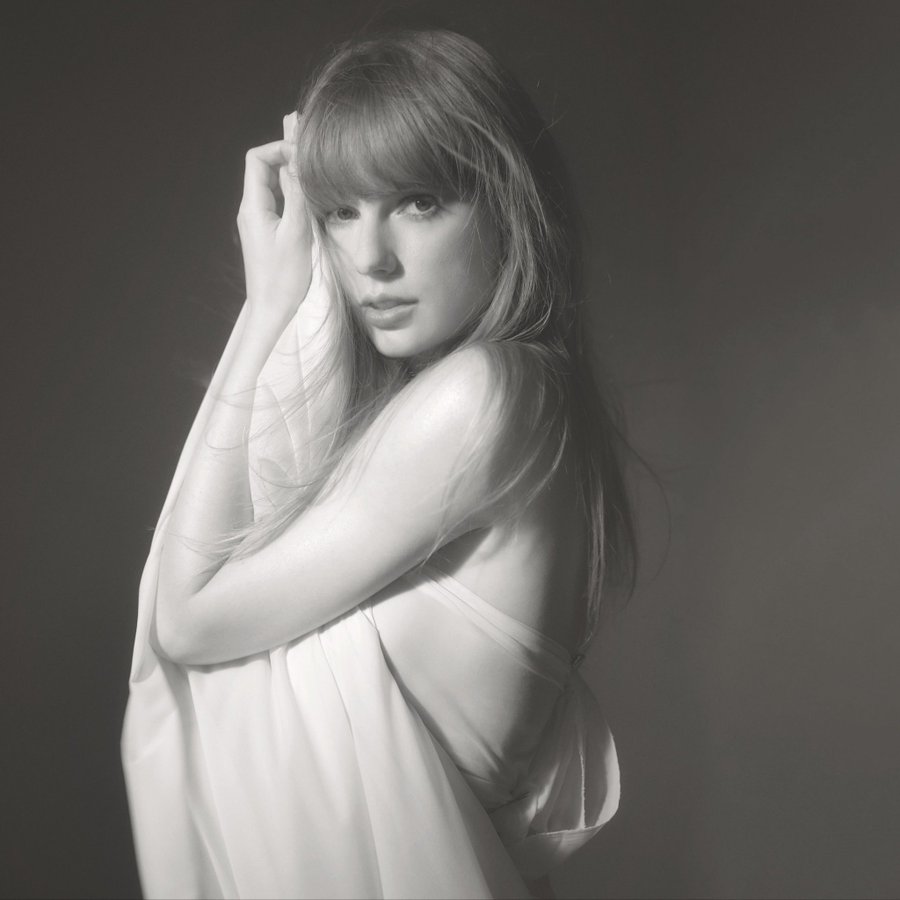
Over 16 songs (and a second LP), the pop superstar litigates her recent romances. But the themes, and familiar sonic backdrops, generate diminishing returns.
If there has been a common thread — an invisible string, if you will — connecting the last few years of Taylor Swift’s output, it has been abundance.
Nearly 20 years into her career, Swift, 34, is more popular and prolific than ever, sating her ravenous fan base and expanding her cultural domination with a near-constant stream of music — five new albums plus four rerecorded ones since 2019 alone. Her last LP, “Midnights” from 2022, rolled out in multiple editions, each with its own extra songs and collectible covers. Her record-breaking Eras Tour is a three-and-a-half-hour marathon featuring 40-plus songs, including the revised 10-minute version of her lost-innocence ballad “All Too Well.” In this imperial era of her long reign, Swift has operated under the guiding principle that more is more.

What Swift reveals on her sprawling and often self-indulgent 11th LP, “The Tortured Poets Department,” is that this stretch of productivity and commercial success was also a tumultuous time for her, emotionally. “I can read your mind: ‘She’s having the time of her life,’” Swift sings on “I Can Do It With a Broken Heart,” a percolating track that evokes the glitter and adoration of the Eras Tour but admits, “All the pieces of me shattered as the crowd was chanting ‘more.’” And yet, that’s exactly what she continues to provide, announcing two hours after the release of “Poets” that — surprise! — there was a second “volume” of the album, “The Anthology,” featuring 15 additional, though largely superfluous, tracks.
Gone are the character studies and fictionalized narratives of Swift’s 2020 folk-pop albums “Folklore” and “Evermore.” The feverish “Tortured Poets Department” is a full-throated return to her specialty: autobiographical and sometimes spiteful tales of heartbreak, full of detailed, referential lyrics that her fans will delight in decoding.
Swift doesn’t name names, but she drops plenty of boldfaced clues about exiting a long-term cross-cultural relationship that has grown cold (the wrenching “So Long, London”), briefly taking up with a tattooed bad boy who raises the hackles of the more judgmental people in her life (the wild-eyed “But Daddy I Love Him”) and starting fresh with someone who makes her sing in — ahem — football metaphors (the weightless “The Alchemy”). The subject of the most headline-grabbing track on “The Anthology,” a fellow member of the Tortured Billionaires Club whom Swift reimagines as a high school bully, is right there in the title’s odd capitalization: “thanK you aIMee.”
At times, the album is a return to form. Its first two songs are potent reminders of how viscerally Swift can summon the flushed delirium of a doomed romance. The opener, “Fortnight,” a pulsing, synth-frosted duet with Post Malone, is chilly and controlled until lines like “I love you, it’s ruining my life” inspire the song to thaw and glow. Even better is the chatty, radiant title track, on which Swift’s voice glides across smooth keyboard arpeggios, self-deprecatingly comparing herself and her lover to more daring poets before concluding, “This ain’t the Chelsea Hotel, we’re modern idiots.” Many Swift songs get lost in dense thickets of their own vocabulary, but here the goofy particularity of the lyrics — chocolate bars, first-name nods to friends, a reference to the pop songwriter Charlie Puth?! — is strangely humanizing.

For all its sprawl, though, “The Tortured Poets Department” is a curiously insular album, often cradled in the familiar, amniotic throb of Jack Antonoff’s production. (Aaron Dessner of the National, who lends a more muted and organic sensibility to Swift’s sound, produced and helped write five tracks on the first album, and the majority of “The Anthology.”) Antonoff and Swift have been working together since he contributed to her blockbuster album “1989” from 2014, and he has become her most consistent collaborator. There is a sonic uniformity to much of “The Tortured Poets Department,” however — gauzy backdrops, gently thumping synths, drum machine rhythms that lock Swift into a clipped, chirping staccato — that suggests their partnership has become too comfortable and risks growing stale.
As the album goes on, Swift’s lyricism starts to feel unrestrained, imprecise and unnecessarily verbose. Breathless lines overflow and lead their melodies down circuitous paths. As they did on “Midnights,” internal rhymes multiply like recitations of dictionary pages: “Camera flashes, welcome bashes, get the matches, toss the ashes off the ledge,” she intones in a bouncy cadence on “Fresh Out the Slammer,” one of several songs that lean too heavily on rote prison metaphors. Narcotic imagery is another inspiration for some of Swift’s most trite and head-scratching writing: “Florida,” apparently, “is one hell of a drug.” If you say so!
That song, though, is one of the album’s best — a thunderous collaboration with the pop sorceress Florence Welch, who blows in like a gust of fresh air and allows Swift to harness a more theatrical and dynamic aesthetic. “Guilty as Sin?,” another lovely entry, is the rare Antonoff production that frames Swift’s voice not in rigid electronics but in a ’90s soft-rock atmosphere. On these tracks in particular, crisp Swiftian images emerge: an imagined lover’s “messy top-lip kiss,” 30-something friends who “all smell like weed or little babies.”
It would not be a Swift album without an overheated and disproportionately scaled revenge song, and there is a doozy here called “Who’s Afraid of Little Old Me?,” which bristles with indignation over a grand, booming palette. Given the enormous cultural power that Swift wields, and the fact that she has played dexterously with humor and irony elsewhere in her catalog, it’s surprising she doesn’t deliver this one with a (needed) wink.
Plenty of great artists are driven by feelings of being underestimated, and have had to find new targets for their ire once they become too successful to convincingly claim underdog status. Beyoncé, who has reached a similar moment in her career, has opted to look outward. On her recently released “Cowboy Carter,” she takes aim at the racist traditionalists lingering in the music industry and the idea of genre as a means of confinement or limitation.

Swift’s new project remains fixed on her internal world. The villains of “The Tortured Poets Department” are a few less famous exes and, on the unexpectedly venomous “But Daddy I Love Him,” the “wine moms” and “Sarahs and Hannahs in their Sunday best” who cluck their tongues at our narrator’s dating decisions. (Some might speculate that these are actually shots at her own fans.) “The Smallest Man Who Ever Lived” is probably the most satisfyingly vicious breakup song Swift has written since “All Too Well,” but it is predicated on a power imbalance that goes unquestioned. Is a clash between the smallest man and the biggest woman in the world a fair fight?
That’s a knotty question Swift might have been more keen to untangle on “Midnights,” an uneven LP that nonetheless found Swift asking deeper and more challenging questions about gender, power and adult womanhood than she does here. It is to the detriment of “The Tortured Poets Department” that a certain starry-eyed fascination with fairy tales has crept back into Swift’s lyricism. It is almost singularly focused on the salvation of romantic love; I tried to keep a tally of how many songs yearningly reference wedding rings and ran out of fingers. By the end, this perspective makes the album feel a bit hermetic, lacking the depth and taut structure of her best work.
Swift has been promoting this poetry-themed album with hand-typed lyrics, sponsored library installations and even an epilogue written in verse. A palpable love of language and a fascination with the ways words lock together in rhyme certainly courses through Swift’s writing. But poetry is not a marketing strategy or even an aesthetic — it’s a whole way of looking at the world and its language, turning them both upside down in search of new meanings and possibilities. It is also an art form in which, quite often and counter to the governing principle of Swift’s current empire, less is more.
Sylvia Plath once called poetry “a tyrannical discipline,” because the poet must “go so far and so fast in such a small space; you’ve got to burn away all the peripherals.” Great poets know how to condense, or at least how to edit. The sharpest moments of “The Tortured Poets Department” would be even more piercing in the absence of excess, but instead the clutter lingers, while Swift holds an unlit match.





